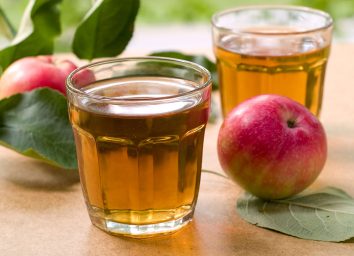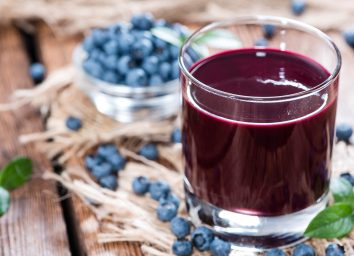One Major Side Effect of Drinking Juice Every Day, Say Experts

Drinking a glass of orange juice every day at breakfast or some cranberry juice with lunch may seem like a harmless—or even healthy—habit. After all, it’s just fruit, right? But whether you know it or not, there’s a big difference between eating half a grapefruit and drinking it in liquid form: the former has fiber. Experts say the fiber found in whole fruits plays a major role in minimizing how the natural sugars they contain impact your body. So, if there’s one major side effect of drinking juice that you should know about, it’s blood sugar spikes—the kind that could increase your risk of type 2 diabetes.
Here’s what you need to know about drinking juice and blood sugar spikes, and for even more helpful drinking tips, be sure to check out our list of the 108 Most Popular Sodas Ranked By How Toxic They Are.
Drinking juice every day will cause blood sugar spikes.
“In the process of juicing, the pulp, pith, and skin of fruit is removed and discarded,” says Cara Harbstreet, RD and LD of Smart Street Nutrition. “The resulting liquid is a more concentrated product in terms of flavor, energy, and nutrients. Fiber is one of the elements that can slow the digestion and absorption of simple carbohydrates from our diets in the GI tract. Without it, simple carbohydrates from fruit and their juice are more rapidly absorbed and may cause a more drastic increase in blood glucose.”
The other drawback to drinking juice, according to Shena Jaramillo, RD, is that juice is an ultra-concentrated form of the fruit, and therefore, tends to have a higher sugar content. For instance, one whole orange only has about 9 grams of sugar, while a 1-cup serving of orange juice packs more than twice that: 21 grams.
“For someone with diabetes, juice can be problematic as it will likely lead to a rapid spike in blood sugars,” she explains. “There are some vitamins and minerals in juice, but these are generally easily obtained from other food sources or whole fruit.”
To be clear, fructose, the natural sugar found in all fruits and their juices, isn’t harmful to your body in reasonable amounts. However, it’s absorbed by your body far more quickly when there’s no fiber intact (as is the case with juice). When that sugar enters your bloodstream, it triggers the pancreas to release insulin.
Over time, when your body is continually dealing with blood sugar spikes, this mechanism can get thrown off, thus leading to insulin resistance. This might explain why a 2013 review found that fruit juice consumption was linked to an increased risk of type 2 diabetes.
Here’s the amazing part, though: researchers found that eating whole fruits—specifically, blueberries, grapes, and apples—had the opposite effect, and was associated with a lower risk of type 2 diabetes.
For this reason, Jaramillo strongly suggests being mindful of how much juice you’re downing on a daily basis—because while it may offer many of the same vitamins as whole fruit, it can contain as much sugar as a candy bar or can of soda, with less fiber to soften the blow on your system.
Still love juice? Here’s how to drink it properly.
All that said, unless you have type 2 diabetes or deal with high blood sugar, there’s no reason why juice can’t be a regular staple in your diet.
“Drinking juice every day is not necessarily an unhealthy habit, especially if few fruits or vegetables are eaten in other forms,” says Harbstreet. “100% juice counts towards the total number of servings of fruits and vegetables, and since most Americans fall short of the recommended 5-9 servings of fruits/vegetables per day, juice can provide additional servings.”
Registered dietitian Natalie Rizzo adds that the serving size for juice is only about 4 oz. (1/2 cup).
“It really depends on the type of juice, the amount, and the person’s lifestyle,” she adds. “For instance, a runner may have some tart cherry juice after every run and it can be beneficial to them and their performance. But a sedentary overweight adult may not need to drink that same amount of juice.”
The bottom line? If you want to avoid those potential blood sugar spikes, your best bet is to opt for whole fruits whenever possible. And when a juice craving hits, heed Harvard researchers’ recommendations and limit your juice consumption to 8 oz. per day.
More Juice Stories on Eat This, Not That!
- Side Effects of Drinking Too Much Orange Juice, According to Science
- What Happens to Your Body When You Drink Apple Juice
- The 7 Best ‘Healthy’ Juice Brands & Which To Avoid at All Costs
- Does Orange Juice Really Help With a Cold? We Asked an Expert
- 10 Fruit Juices to Always Leave on Grocery Store Shelves








